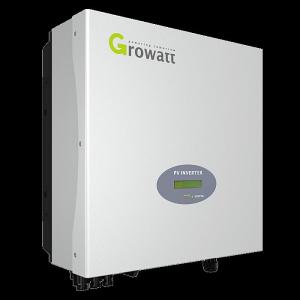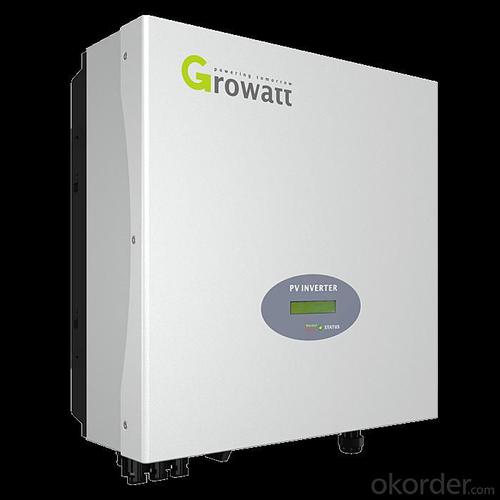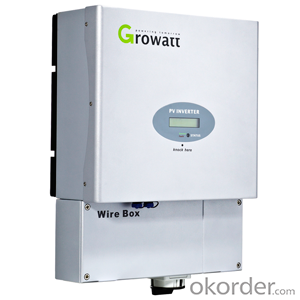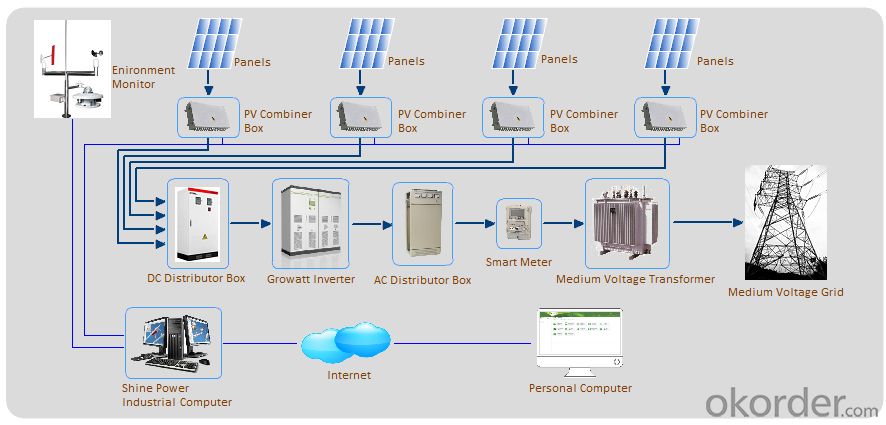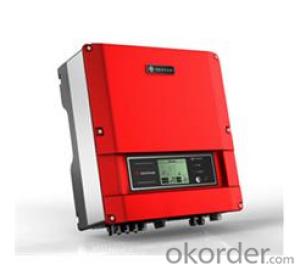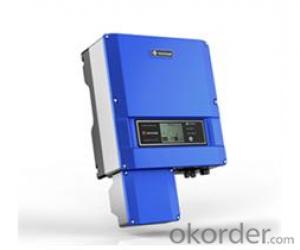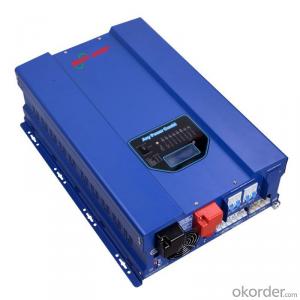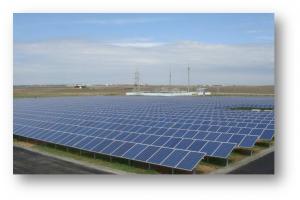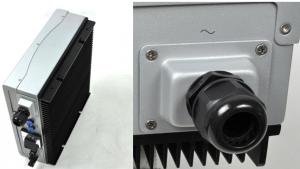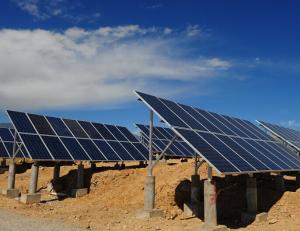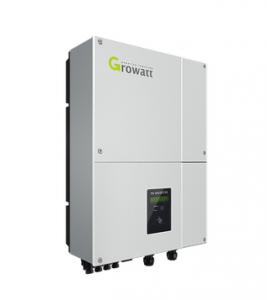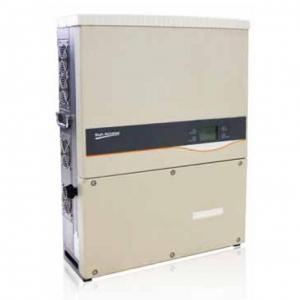Solar Inverter 220 Volt Grid-Tied Solar PV Inverter 20000TL - Flexible and Economical System Solution
- Loading Port:
- Shanghai
- Payment Terms:
- TT or LC
- Min Order Qty:
- 10 unit
- Supply Capability:
- 10000 unit/month
OKorder Service Pledge
OKorder Financial Service
You Might Also Like
High-yield
·Max98.2% efficiency
·Realtime precise MPPT algorithm for max harvest
·Wideinput voltage operation range from 250V to 960V
Allin one. Flexible and economical system solution
·DCswitch(option)
·DCsurge protection device(option)
·ACsurge protection device(option)
·Built-inPV Combiner(option)
·Powermanagement unit
·Optimumselection for big PV plants, commercial buildings...
Lowmaintenance cost
·Detachablecover for easy installation
·Rust-freealuminum covers
·Flexiblemonitoring solution
·Multifunction relay can be configured to show various inverter information
Intelligentgrid management
·LVRTsupport
·Reactivepower adjustable
·Selfpower reducer whenover frequency
·Remoteactive/reactive power limit control
Technical Data | SOFAR 10000TL | SOFAR 15000TL | SOFAR 17000TL | SOFAR 20000TL |
Input (DC) | ||||
Max. Input Power | 10400W | 15600W | 17700W | 20800W |
Max. DC power for single MPPT | 6750(450V-850V) | 10500(500V-850V) | 10500(500V-850V) | 12000(500V-850V) |
Number of independent MPPT | 2 | |||
Number of DC inputs | 2 for each MPPT | 3 for each MPPT | ||
Max. Input Voltage | 1000V | |||
Start-up input voltage | 350V(+/-1V) | |||
Rated input voltage | 600V | |||
Operating input voltage range | 250V-960V | |||
MPPT voltage range | 350V-850V | 370V-850V | 420V-850V | 430V-850V |
Max. Input current per MPPT | 15A/15A | 21A/21A | 21A/21A | 24A/24A |
Input short circuit current per MPPT | 20A | 27A | 27A | 30A |
Output(AC) | ||||
Rated power(@230V,50Hz) | 10000VA | 15000VA | 17000VA | 20000VA |
Max. AC power | 10000VA | 15000VA | 17000VA | 20000VA |
Nominal AC voltage | 3/N/PE, 220/380 3/N/PE, 230/400 3/N/03, 240/415 | |||
Nominal AC voltage range | 184V-276V | |||
Grid frequency range | 50Hz, +/-5Hz | |||
Active power adjustable range | 0~100% | |||
Max. Output Current | 15A | 22A | 25A | 29A |
THDi | <3% | |||
Power Factor | 1(Adjustable +/-0.8) | |||
Performance | ||||
Max efficiency | 98.2% | |||
Weighted eff.(EU/CEC) | 97.6%/97.8% | 97.9%/98% | 97.9%/98% | 98%/98.1% |
Self-consumption at night | <1W | |||
Feed-in start power | 45W | |||
MPPT efficiency | >99.5% | |||
Protection | ||||
DC reverse polarity protection | Yes | |||
DC switch | Optional | |||
Protection class/overvoltage category | I/III | |||
Input/output SPD(II) | Optional | |||
Safety Protection | Anti-islanding, RCMU, Ground fault monitoring | |||
Certification | CE, CGC, AS4777, AS3100, VDE 4105, C10-C11, G59(more available on request) | |||
Communication | ||||
Power management unit | According to certification and request | |||
Standard Communication Mode | RS485, Wifi(optional), Multi-function relay | |||
Operation Data Storage | 25 years | |||
General data | ||||
Ambient temperature range | -25℃ ~ +60℃ | |||
Topology | Transformerless | |||
Degree of protection | IP65 | |||
Allowable relative humidity range | 0 ~ 95% no condensing | |||
Max. Operating Altitude | 2000m | |||
Noise | <45dB | |||
Weight | 45kg | 45kg | 48kg | 48kg |
Cooling | Nature | Fan | Fan | Fan |
Dimension | 707×492×240mm | |||
Warranty | 5 years | |||
FAQ
Where can I buy your products?
You could find our products from dealers or contact our sales team directly. We will provide you with detailed services.
How to contact us?
Contact details can be found from website www.okorder.com to contact us. We look forward to providing you with professional services.
What is the application field of your products?
They can be used in the small photovoltaic (PV) grid power generation systems of family units as well as the commercial photovoltaic system such as BIPV, BAPV and etc.
What kinds of modules do your inventers support?
Our inventers support most of mainstream components and modules in the market. Should you require more details, please do not hesitate to contact our technical personnel.
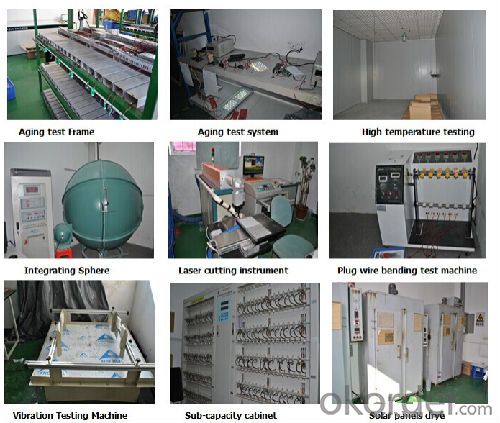
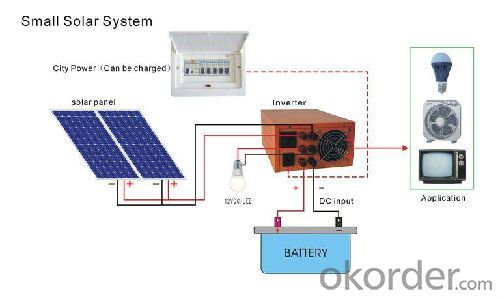
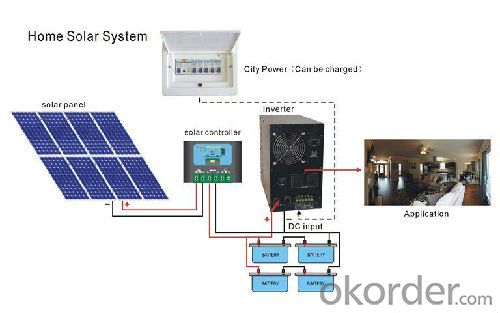
- Q: How does a solar inverter handle grid synchronization during startup?
- During startup, a solar inverter handles grid synchronization by employing a process called anti-islanding. The inverter continuously monitors the grid voltage and frequency to ensure that it matches the required standards. It remains disconnected from the grid until it detects stable and synchronized grid conditions. Once the grid parameters are within the acceptable range, the inverter synchronizes its output waveform with the grid and gradually ramps up its power production. This ensures a smooth and safe integration of the solar system with the grid, preventing any potential issues like islanding or instability.
- Q: What is the maximum power rating of a solar inverter?
- The maximum power rating of a solar inverter typically depends on the specific model and manufacturer. It can range from a few hundred watts for small residential inverters to several megawatts for large-scale commercial or utility-grade inverters.
- Q: Can a solar inverter be used with different grid voltages or frequencies?
- No, a solar inverter cannot be used with different grid voltages or frequencies. Solar inverters are designed to convert the DC power generated by solar panels into AC power that matches the specific voltage and frequency of the local electrical grid. Using a solar inverter with different grid voltages or frequencies can lead to compatibility issues and may result in inefficient or malfunctioning operation of the system.
- Q: What are the potential risks of over-discharging a battery connected to a solar inverter?
- The potential risks of over-discharging a battery connected to a solar inverter include reduced battery lifespan, damage to the battery cells, decreased battery capacity and performance, and potential safety hazards such as overheating or even battery failure.
- Q: Can a solar inverter be used with a solar-powered electric gate system?
- Yes, a solar inverter can be used with a solar-powered electric gate system. The solar inverter is responsible for converting the DC power generated by the solar panels into AC power, which is required to operate the electric gate system. This allows the solar energy to be utilized efficiently in powering the gate system.
- Q: How does a solar inverter handle shade on solar panels?
- A solar inverter handles shade on solar panels by employing a technology called Maximum Power Point Tracking (MPPT). MPPT allows the inverter to constantly monitor the output of each individual solar panel and adjust the voltage and current to maximize the power output. When shade is present on one or more panels, the inverter can dynamically optimize the power generation by bypassing the shaded panels or reducing their impact on the overall system performance.
- Q: What is the role of a solar inverter in a battery storage system?
- The role of a solar inverter in a battery storage system is to convert the direct current (DC) electricity produced by the solar panels into alternating current (AC) electricity, which is compatible with the electrical grid and can be used to power household appliances or feed back into the grid. Additionally, the solar inverter manages the charging and discharging of the batteries, ensuring efficient energy storage and usage.
- Q: Can a solar inverter be used in remote areas without access to the grid?
- Yes, a solar inverter can be used in remote areas without access to the grid. Solar inverters are designed to convert the direct current (DC) electricity generated by solar panels into alternating current (AC) electricity that can be used to power electrical devices. In remote areas, solar inverters can be used to harness the energy from the sun and provide a reliable and sustainable source of electricity, without the need for a connection to the grid.
- Q: What are the key considerations for selecting a reliable solar inverter manufacturer?
- When selecting a reliable solar inverter manufacturer, key considerations include the manufacturer's reputation and experience in the industry, the quality and reliability of their products, the efficiency and performance of their inverters, the warranty and after-sales support provided, the compatibility of their inverters with your specific solar system requirements, and the manufacturer's financial stability and longevity in the market. Additionally, checking customer reviews and feedback can provide valuable insights into the manufacturer's track record and customer satisfaction.
- Q: Can a solar inverter be used with a wind turbine?
- Yes, a solar inverter can be used with a wind turbine. Both solar panels and wind turbines generate DC (Direct Current) power, which needs to be converted into AC (Alternating Current) power to be used in households or connected to the grid. A solar inverter can perform this conversion for both solar and wind power sources. However, it is important to note that there are specialized wind turbine inverters available that are specifically designed to optimize the performance and efficiency of wind turbines.
Send your message to us
Solar Inverter 220 Volt Grid-Tied Solar PV Inverter 20000TL - Flexible and Economical System Solution
- Loading Port:
- Shanghai
- Payment Terms:
- TT or LC
- Min Order Qty:
- 10 unit
- Supply Capability:
- 10000 unit/month
OKorder Service Pledge
OKorder Financial Service
Similar products
Hot products
Hot Searches
Related keywords
